TV Watch: My Bests, Worsts and Mehs
No Emmy predictions; just my brain wandering through this past year’s tv
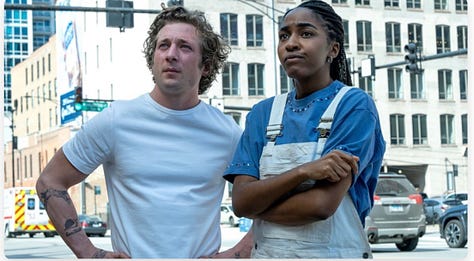
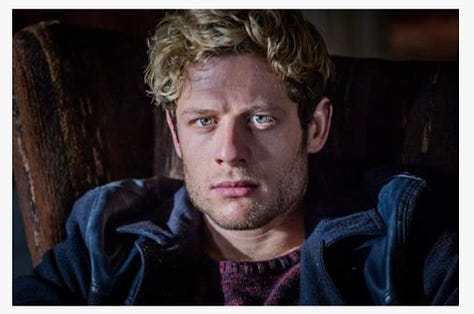
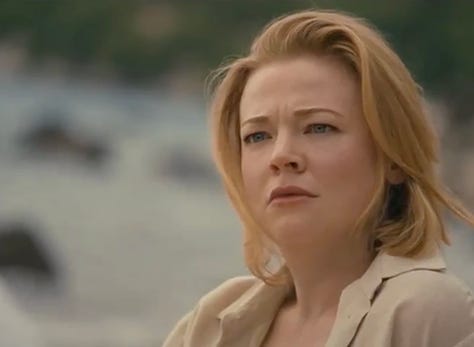
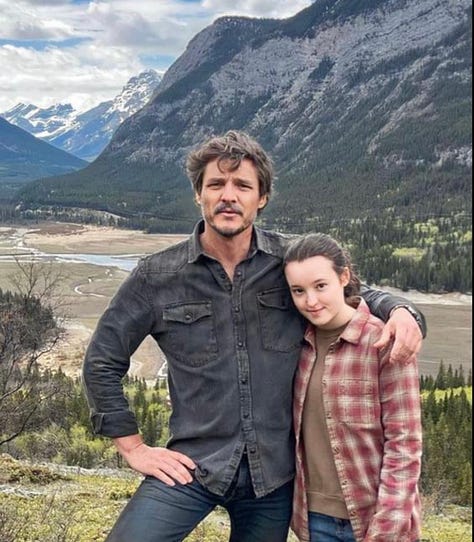
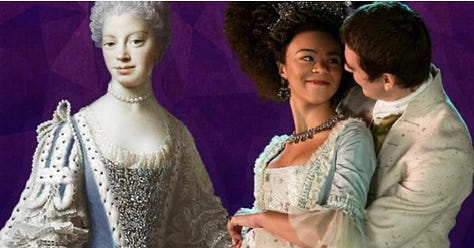
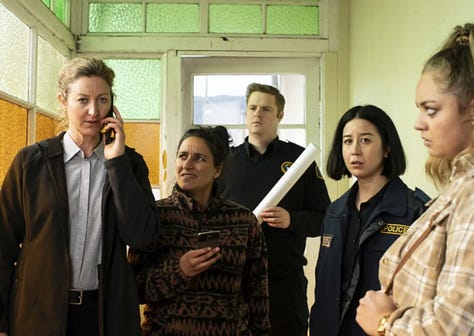
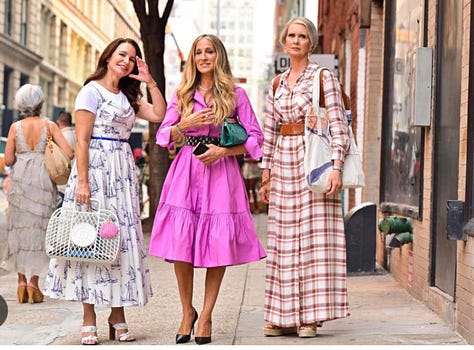
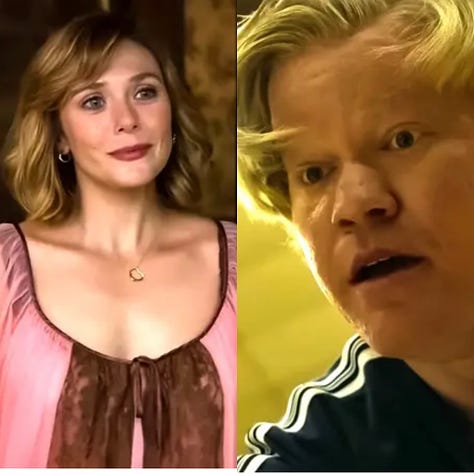
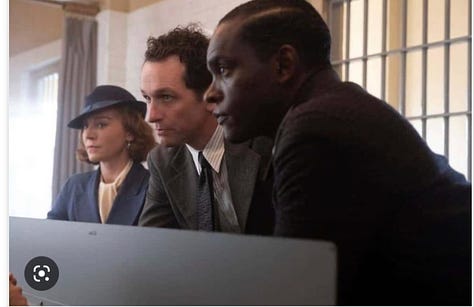
Best Series: “The Bear”
Before I watched the second season of “The Bear,” I would have put “Succession” in my top spot. But “The Bear” put into sharp focus what had been nagging me about “Succession” since the first season. Addictive as it was, with the exception of a couple of stand-out episodes—Logan’s death, Siobhan and Tom’s break-up—“Succession” didn’t have much in the way of heart. And what “Succession” lacked, “The Bear” serves up in in a second season that no one can mistake as just about the chaos of opening a restaurant.
It’s not an insignificant detail that Sydney’s father gives her a book she carries around for months: Leading With Your Heart. Because I’m a compulsive researcher, I actually read a few pages of Coach K’s (Krzyewski) book about how he turned around a losing team by listening rather than bullying, getting to know every member intimately, and building relationships: “Because if a team is a real family, its members will want to show you their hearts.” (pp. 31-32, Leading With Your Heart).
That’s what happens in season two. In season one, we saw all the characters’ attempts to deny grief and loss (not just of people, but of confidence and hope) by shutting down, running away, keeping their bruises hidden to each other. Season two, as if following coach K’s advice, is about each character’s opening up—to each other and to us. (And of course—not to strain the metaphor—they open up a new restaurant too.) The pace of the show slows way, way down, and we get to know all the main characters more intimately—and tenderly.
I never understood why more reviewers didn’t “get” how much the first season was about what a long, ferocious tail grief has. Maybe the hectic pace of the first season? Maybe the need to be distracted from our own post-pandemic depression by sharp writing and memorably hilarious situations? But that was the first season. It’s truly absurd that the Emmy nominations placed the second season in the category of “comedy.” Perhaps they had in mind the classic (Greek; Shakespearean) form of comedy, in which things fall apart and then come together in joyous reunion? I doubt it. “Family and Friends” night at the restaurant is a huge success—but Carmy himself remains haunted by his demons.
“Succession” was a great show. But it lent itself to a kind of shallow nastiness among fans and reviewers, who preferred to debate about who won the power-game every week than to dive deep into the characters. I was addicted, dazzled, absorbed. But In the end, “The Bear” had my heart.
For my full review, click here.
Expiration Date Passed: “And Just Like That”
I don’t really care who has had cosmetic surgery. It’s ok that they are so over-privileged that the loss of a handbag is a major crisis. I don’t expect lifestyle reality from a comedy in 2023 any more than I expect it from a 1930’s screwball comedy. What’s depressing is to see the show try so hard to be relevant to 2023, and fail so miserably at it. Throwing some Black and Brown replicants in there doesn’t do it. Having Miranda struggle with a strap-on certainly doesn’t do it. Trying to recapture the pushing-the-envelope-about-sex quality of the first seasons by having Charlotte teach vaginal muscle strengthening exercises to her husband is to cringe from. I’m cringing now just thinking about it.
And I have to ask myself: If the writers care so much about being up-to-date, why are the characters aging backwards? Miranda, who once provided some bracing cynicism, has become a helpless, squeaky-voiced ditz (“feminine” compensation for making her a lesbian?) Charlotte was always too perky, but the show used to poke fun at her over-privileged naivete; now she’s the maven of kugel and kegel. And she smiles constantly, looking like a hybrid of Gidget and The Joker. Samantha is…sob…gone. Carrie is still mostly Carrie, but in repulsively ageist episode, obsesses over being invited to a party of “old ladies” (hosted by Candace Bergen and attended by Gloria Steinem.) All the characters need to follow Susan Sontag’s advice: “Instead of being girls, girls as long as possible, who then age humiliatingly into middle-aged women, they can become women much earlier – and remain active adults, enjoying the long, erotic career of which women are capable, far longer.” (From Susan Sontag - The Double Standard of Aging, 1972)
I did like it when Carrie lied about having COVID. Refreshing, but temporary, dose of “fuck you” to political correctness.
Watch This Instead of “And Just Like That”: “Deadloch”
You want lesbian humor? Forget Amanda and her strap-on. Check out the all-female choir of “Deadloch” singing “When I Think of You, I Touch Myself.” I peed in my pants.
“And Just LIke That,” although a “comedy,” takes its characters dilemmas and its own (often misplaced) politics so seriously. “Deadloch” sends up everything: British detective procedurals (love them, but face it, they’re pretty grim), “green” politics, sexual stereotypes (the aggressively macho, boot-stomping Eddie is—surprise!—into men. Bizarre men, true, but then most of the men in the series are), male “feminism,” homophobia, small town festivals, lesbian over-caretaking. And it has characters that are as fresh and disarming as the girls of “And Just Like That” are irritatingly predictable. The pairing of Kate Box and Madeleine Sami as seemingly mismatched detectives Dulcie (tall, reserved, thoughtful, polite) and Eddie (compact, foul-mouthed, burping, bullying) is improbable and inspired. It’s entertaining just to see them together, they’re such a weird and wonderful physical contrast, and their evolving relationship is sweet to watch. Dulcie’s marriage to Cath (Alicia Gardiner) in contrast, although it starts out looking ideal, turns out to be more fraught: Dulcie loves being a detective; Cath wants more relationship-time. But they work it out.
The series had me at the choir. Then it lost me a bit by descending into more chaos and loud, non-stop action than is my taste. Eddie’s voice started to irritate me at one point, but once she changed into LL Bean sweaters, she got sort of adorable. I ended up loving everyone in it.
There are so many hysterical exchanges and situations, this is one show that deserves the description of “comedy.” The last line alone is worth the price of admission.
Creators and writers: Kate McCartney and Kate McLennan.
Why the Hell wasn’t it Renewed?: “Perry Mason”
This was such a good show! Was it too “real” to be wildly popular? In my review of the season finale, I wrote:
From my first piece on the “Perry Mason” reboot, a recurring theme of mine has been how the show breaks apart the conventional mold of the courtroom drama. Its innovations aren’t forced or arbitrary, though. It was the old conventions that were the artifice: fantasies of justice triumphant, heroes who always knew best, women satisfied to serve them, and a whole lot of stuff shoved in the closet—poverty, racism, non-hetero relationships.
What “Perry Mason” does may not be what some viewers are looking for: It doesn’t build a new house, it gives us a tour of the old—but with all that was locked away open to view. You don’t have to travel to the future or an alternative universe in order to deconstruct the troubles of the present; they are right there in our own past, simmering beneath the surface of our sturdy fictional fantasies.
I guess we prefer the fantasies. (I don’t know why we can’t have both.) “Perry Mason,” to the dismay of fans, wasn’t renewed.
For my week-by-week discussions of why I loved this show, click here, here, here, here, and here. Yes, I followed the whole season.
Most Interesting Psychopath: Tommy Lee Royce (of “Happy Valley”)
Every superhero deserves a super-nemesis. Tommy Lee Royce (James Norton), a drug dealer/rapist/murderer whose rape of Catherine Cawood’s (Sarah Lancashire) daughter Becky left her pregnant and suicidal, is the most compelling psychopath we’ve enjoyed since Villanelle, from “Killing Eve” (for more on her, see my review here.) Like Villanelle, he is disarmingly gorgeous. Unlike Villanelle, he has no playful side. For most of the three seasons, he doesn’t even seem to have a human side. The trail of human damage he leaves is matched only by Catherine’s righteous fury, which has gripped her since season one, and which is a thread that links all the seasons together.
I’m not sure why James Norton was chosen for the role of Tommy Lee Royce, but it was a brilliant choice. Audiences were getting to know him (and many falling in love with him) in Grantchester as the adorably sexy vicar everyone in the village wants to lead into sin. Tommy Lee Royce, capable of running his car back and forth over the broken body of a young policewoman, raping a gagged and terrified kidnap victim, and pouring gasoline over his own son with the deranged fantasy of setting them on fire together, is so far from Sydney Chamberlin that despite Norton’s distinctive good looks, many viewers had to ask if this was the same actor. (This season, Royce, whose hair and beard had grown long and Rasputin-like in prison, gets a haircut; when I posted a clip, one of my facebook friends exclaimed “Oh! There’s Sydney Chamberlin!”)
That’s a testament to Norton’s acting. But for those of us who recognized Sydney, our lingering affection for the vicar—not to mention how gorgeous Norton is—also makes Royce a much creepier adversary. It makes it harder not to feel a tug of attraction for him, and that’s a far more insidious effect than a villain whose exterior is as repulsive as his evil inner life. Watching him get that haircut was almost like a strip-tease—which the show unabashedly exploited, showing us the whole thing from first swath cut by the electric razor to a bare-chested Royce preening in front of the mirror.
For Catherine, though, he’s simply the incarnation of pure evil, and she can’t even stomach the possibility that her daughter might have been attracted to him at some point (which of course doesn’t preclude the fact that he raped her.) But then, in the finale, when they finally come face to face, he says some things that insert a little bit of mystery into the Tommy/Becky backstory that we’ve only been told about from Catherine’s point of view:
Tommy: I loved her. I loved her!
She made me feel normal.
And then she didn't want to know me, and that's when I got cross.
And that was you.
Catherine: Well, I don't know what you're talking about.
Well, perhaps we know what Tommy is talking about, because we’ve seen Catherine’s cocky confidence in her own judgment, and how cruel she can be when those she loves don’t do what she asks of them. I loved Catherine (I’ve written about her here.) But she has the self-righteous passion of an avenging angel, and I can imagine her fury at Becky for taking up with a low-life like Tommy, and her unwillingness to listen to Becky’s side of it. Perhaps, too, we can even imagine that Tommy has touched a nerve of guilt in that final conversation.
Did Royce love Becky? After the final episode, we’re not so sure anymore. Does he love his son Ryan? We’re not so clear on that any more either. He tells Catherine:
I had some options last night.I had a can of petrol and a box of matches,
and it did occur to me that I could burn your house down and all the shit in it,but I decided not to do that.And do you know why?
Next time you're thinking all this nasty bollocks about me, I were looking at them pictures of Becky...and Ryan. His whole life, from when he were a baby.
All them years I never even knew him.And do you know what I realised?
I realised...I realised what a nice life he's had.What a nice life YOU'VE given him.
I hated you.I hated you for not telling me I had a boy. But last night, I had a glimpse of what a nice life he's had. And I don't hate you anymore.
He then douses himself with gasoline, and warns Catherine that if she tasers him it might spark him off and she might get killed as well, and continues:
Believe it or not....I don't want you
to get done, you deaf bitch! I want you to be here...with Ryan.
So I'll do it me self.
And he sets himself ablaze, screaming.
“Happy Valley” is perhaps the greatest British procedural of the past ten years (and the seasons do roughly span that time period.) It’s Sally Wainwright’s writing, it’s Sarah Lancashire’s acting. And it’s the fact that Tommy Lee Royce is not the shadowy, impersonal presence that exists in many thrillers largely to be the object of pursuit. That last, protracted conversation between the two of them is so exactly right. Some viewers might wonder why Catherine indulged him—and herself—rather than just tasing him straight off. But that would be have been a betrayal of Catherine, and of us, too, having invested so much in getting to this final confrontation. They each needed to speak their truth to each other—and it’s not exactly as neat as a fatal bullet. Tommy doesn’t become less of a psychopath in our eyes. But he does reveal, as other characters have throughout the series, that nothing is pure, not even evil.
In England, James Norton’sTommy Lee Royce was voted the best villain on TV, winning the title overJodie Comer as Villanelle in Killing Eve (who will always be my favorite psychopath), JR Ewing in Dallas (Is that still airing?), Sherlock Holmes’ nemesis Moriarty and Coronation Street serial killer Richard Hillman.
For my full review of “Happy Valley”, click here.
Most misunderstood character in a series: Siobhan Roy.
“Succession” is another show I wrote about every week this season. I started out disliking the show for its constant stream of coded banter. But, having decided to write about it, I began to watch every episode twice, the second time in bed with my iPad, viewing the characters up close and personal, the relationship dynamics unobscured by clever verbal joisting and bidding wars.
It’s in the up close and personal that the show reveals itself as a great novel, not just a platform for entertaining sparrring and power-plays but a compelling family saga. And although I still often felt like a clueless nerd at a gathering of cool kids, the characters and their relationships kept me coming back, week after week.
I was particularly drawn to the character of Siobhan, who I initially saw only as the wife from hell, but eventually came to sympathize with. But I discovered I was among a minority. I tend not to use words like “misogyny”—not because I’m afraid of being seen as a rampaging feminist (which I of course am), but because it’s too imprecise. Women who behave as they are supposed to are not hated. It’s the ones that step out of line—think too much of themselves, or are too ambitious, and most importantly, refuse to apologize for themselves—who stir up the cultural unconscious in unpleasant ways.
Siobhan Roy, apparently, was that kind of woman. In the world of “Succession,” unscrupulous and manipulative behavior was the norm. Yet there’s nothing like a massing of “Ken-haters” (or even “Logan-haters”) that’s anything like the stream of Shiv-hate on fan pages. “I can’t tell you how much I hate her.” “She’s absolutely the worst of the lot.” “I have no sympathy for that conniving twat” “And couldn’t she even be bothered to put her hair up properly for Connor’s wedding?” Fans were gleeful when Kendall “told her off” in the “America Decides” episode, having found out that she lied to him about her alliance with Matsson. “I’m so glad that lying, manipulative POS was exposed” one wrote, conveniently ignoring that before Shiv teamed up with Matsson, her brothers had over and over betrayed their promise to be a triumvirate. They lavished sympathy on Tom when he accuses Shiv, during their big fight at the end of “Tailgate Party,” of offering him up as the sacrificial lamb for the cruise ship scandal. They apparently didn’t remember how she privately went to Logan and begged him: “Please, for me, anyone but Tom.”
I’m not going to repeat my own view of Siobhan here (if you’re interested, see my weekly “Succession” posts: March 26, April 2, April 9, and for Siobhan, especially April 22, April 26, May 3, May 17, and May 30.) But it wasn’t until the end of the season that I realized it wasn’t just projection on the part of fans. Writer Jesse Armstrong seems to have had a bit of a Shiv-problem, too. In the “Controlling the Narrative” documentary that followed the finale episode, he described (pregnant!) Siobhan as in “a terrifying, frozen, emotionally barren place.” I certainly didn’t see her that way, and neither did Emmy-nominated director Mark Mylod, who speaks much more tenderly of the character. He also praises Sarah Snook as “living proof of how a performer can completely transform a piece of writing.”
He’s talking about her telephone call to the (likely) dead Logan. But if you watch her in other scenes as well—in the plane, on the telephone to Tom, asking if their relationship still has a chance, or on the stairs telling him of her guilt over having contributed to Logan’s death—you can see how Snook (and Mylod) use gesture and facial expression to reveal the nervous vulnerability, the unease, the urgency to run away from (or talk back to) impending hurt, cracking through the brittle surface.
It’s almost a certainty that Jesse Armstrong will win the Emmy for his writing, which is beyond description in its ingenuity, smarts, humor, and craft. But I now see Mylod, who is up for direction and Snook, up for actress, as having had to work against something of a woman-problem in Armstrong’s script. For Armstrong, she was “Shiv”; Mylod and Snook gave us Siobhan.
Evolving Love: Bella and Joel in “The Last of Us”; Queen Charlotte and King George in “Queen Charlotte”
I tried to watch the latest season of “Jack Ryan.” I had been looking forward to it, but I couldn’t get into it. I can’t do action movies with complex plots anymore. I don’t have the patience to sort out who is chasing whom or why. I liked “Jack Ryan” when he was an analyst nerd forced to discover his talents as a CIA agent. But now that he’s fully at home as a spy, he isn’t very interesting as a character.
What fed my soul this year? “Aftersun”, “The Banshees of Inisherin,””1883,” “Happy Valley,” “The Bear.” Parts of “Succession,” “Perry Mason,” and “The Last of Us.” The parts that had fans talking about relationships, life, death, love. And others, but these stand out. Not so different from what I wanted when I was a lonely teenager who looked for novels with characters I could love and plots that weren’t embarrassed to be “uncool.” I wasn’t a cool kid, although I tried to be.
When I heard about this series, “The Last of Us,” that was based on a computer game, I had zero interest in checking it out. But for some reason, I did anyway, and discovered that although there were zombies running around, sticking their grotesquely long and fungus-y tongues in people’s mouths, the show was really about the evolution of a love (love, not sex) relationship between a traumatized, emotionally walled off man (Pedro Pascal) and a 14 year-old post-apocalypse generation girl (Bella Ramsey.)
Ellie’s bravery and survival skills are handy in dealing with the deadly obstacles they meet during their trek across the States, heading for the outpost where Bella’s immunity to infection may (or may not) provide the key to a vaccine. But she is as affectionate, tolerant, and craving connection as she is tough, and for many episodes she babbles away good-naturedly, seemingly immune to Joel’s taciturn, irritated responses. He’d lost his daughter in the first wave of marauding zombies, and he’s not about to open his heart easily to Ellie But it turns out Ellie is just the kind of personality to break through, and when, after she escapes from a crazed pseudoChristian cannibal, Joe catches her and embraces her—“It's okay, baby girl.I got you.I got you”-even the scriptwriters were bawling. 1
There’s something so eternally satisfying about emotional walls coming down. It happens, too, in Shonda Rhimes “Queen Charlotte” Series, meant as a prequel to “Bridgerton.” When Charlotte (India Amarteifio) and George (Corey Mylchreest) first meet, she doesn’t know that he suffers from panic attacks (variously diagnosed over the centuries, according to prevailing psychiatric fashion.) What she sees on first meeting is a charming, gentlemanly, physically swoon-worthy young man—we’re talking a McDreamy here, especially when he’s a shirtless “Gardener George”—and for Charlotte, who has been dreading the arranged marriage, it’s love at first sight. Apparently it is for him too (her “brown-ness” doesn’t seem to bother him the way it does his mother, Princess Augusta.) So when, the night after the wedding, he drops Charlotte off at her separate residence of Buckingham house (later to become Buckingham Palace) and retires on his own to Kew, it’s as startling and perplexing to the viewer as it is to Charlotte.
Charlotte endures endless solitary meals until she finally loses patience and confronts George in his observatory, where’s he’s hidden himself away, studying the transit of the planet Venus. But he sends her away again, and Charlotte continues to stew, imagining she has done something wrong.
Eventually, George does come out of his observatory, and they have fantasy-perfect sex (Lady Danbury has taught Charlotte about what to expect, and George has reassured her that the “part where my head hits the wall over and over” need not be a part of it.) But an overheard and misunderstood conversation between the George and his mother sends Charlotte running away, and George, distraught, feels the familiar signs of panic coming on. The wacko doctor Monro is summoned, and unknown to Charlotte, George is subjected to a sadistic regime (some of which is historically probable) of physical restraints, ice-baths, beatings, and other forms of torture meant to extract submission and self-control.
Charlotte remains perplexed by George’s behavior right up until the end of episode three, when she is awoken in the middle of the night to find George mumbling incoherently about Venus and drawing strange shapes on the bedroom wall. She follows him into the garden, where he is talking to the planet Venus. “No, I am Venus. Right here,” Charlotte says.
George ( chuckling ) You are Venus?
Charlotte: Yes. And Venus is going inside. You need to come with me.
George:. I thought...I thought you were in the sky.
Charlotte: I was in the sky, but now I am going inside. Into Buckingham House. Here. Here. Come on.
George: Venus... is indoors.
Charlotte: Venus is indoors. With you. She is with you.
Don’t ask how Charlotte, who is just seventeen, came to be so wise about how to tend to a person who is having a meltdown. It’s a feature of her personality, as drawn by Rhimes, that is surprising, endearing, and an answer to the mystery of how these two did actually remain together all their lives, sleeping in the same bed (very unusual for royals of the period), Charlotte bearing fifteen (!!!) children, thirteen of which survived to adulthood (one of them fathered the future Queen Victoria.) The answer given here may be fictional, but—like the best fictions—it gifts us with a truth more significant than mere fact. When you love someone—truly, madly, deeply—what the rest of the world might label and shun as “madness,” being inseparable from the person that one loves, is to be accepted and loved. Tended—not pathologized.
And so it remains, right up until the end of the season, when Charlotte, now a much older, regal and often imperious monarch (Golda Rosheuvel, reprising her role from “Bridgerton”) crawls under the bed to be with a panicky, incoherent George, who is soothed by her presence. To the rest of the world, he’s “mad King George.” To Charlotte, he’s the charming young man she fell in love with in the garden.
For my full review, including detailed discussions of controversies about race and historical depictions, click here.
Best Song: “Long, Long Time” (in the Bill and Frank episode of “The Last of Us”)
If you’ve seen the series, I don’t need to say any more. All I have to do is hum a few bars and I’m weeping. It’s a great song in any context, and in this episode it becomes a transcendent, timeless evocation of love and loss. As to the episode itself, I loved that they both were bears. So nice to see two hairy chests in bed together. Pretty lucky, huh, to have the one uninfected invader of your survivalist castle become your lover for life!
Under-rated: “Love and Death”
This is based on a real thing that happened, previously incarnated in another series (“Candy” with Jessica Biel in the title role,) and before that, a movie (“A Killing in a Small Town” with Barbara Hershey as Candy) but this version does something very different from the other two: rather than making the killing (suburban housewife Candy Montgomery hatchets neighbor whose husband she had an affair with) the focus, “Love and Death” spends a lot of time on the affair itself and the suburban community that is the real killer of souls. Nearly everyone except Candy’s excitable lawyer is in a zombie state. And it’s mesmerizing. Going to church appears to put you in such a stupor you have sex with the ugliest guy in town just to stay awake. He’s even more of a zombie than you. And your husband is more of a zombie than him. Then you hack someone to death while in a zombie state. But really, it’s totally gripping! Even my husband, who usually watches tv in a zombie state himself, was fascinated by it.
“Love and Death” has the most ”I can’t believe she’d do it with this guy” sex affair I’ve ever seen. That in itself leads to fresh thoughts about why people hook up with each other. We’re so accustomed to both partners in sin being equally gorgeous, even when the context is boring suburbia with little to offer. But Elizabeth Olsen is astoundingly lovely, and Jesse Plemons is…I don’t want to be offensive here…let’s just say it’s hard to believe the actor isn’t stuck playing character-parts. (I gather, from recent premiere photos, that he’s lost a bunch of weight and glammed himself up—and I’m not being fat-shaming, Jim Gandolfino was hot—but I’m glad he didn’t do it until after the series was finished because it wouldn’t be as interesting.)
As a satire on church-going suburbanites it’s both chilling and very, very funny. Particularly when the wife appears in the doorway with the hatchet.
Most Disappointing Ending: “Fleischman is in Trouble”
This was a show that began by being annoying, then for one episode became great, then descended in the finale into…I’m not even sure what to call it—perhaps cowardly? without imagination? lazy? Fucked up?
For most of the series, we see Rachel Fleischman (Claire Danes) as virtually the Platonic form of the ambitious, materialistic, driven, non-maternal, job-obsessed working woman. Brittle. Cold. Lousy values. Etc. A caricature taken straight from the annals of misogyny. But that, as we learn in the penultimate episode, is all wrong—or at least, a hugely distorted, uninformed view. While her husband Toby (Jesse Eisenberg) has kvetched endlessly about her abandonment of her family, Rachel has actually suffered a nervous breakdown that causes her to lose all sense of time. We also learn of a severe postpartum depression, brought on in part by a doctor’s violation of her as she was giving birth. We see the role fears of abandonment have played throughout her life. We see how clueless Toby has been (a welcome turn for viewers like myself who found him insufferable from the beginning.) And so on.
I loved the episode. Rachel’s story—how she became the person that she was—was replete with details that I’m sure were recognizable to many working women from unprivileged backgrounds whose ambitions are caricatured, whose vulnerabilities are ignored, whose struggles are belittled, and whose need for safety propels so many of their choices—even toward marriage with a self-righteous nerd like Toby. Like the women in Rachel’s therapy group, I “get” how one can be raped by a doctor without his penis playing any role at all, and how traumatic and life-changing it can be. And I savored the fact that revelation of her experience validated my annoyance with irritating, holier-than-thou Toby, who we were seemingly supposed to sympathize with for so many episodes.
But then….in the final shot of the last episode it appears that she is going back to him. I’m not sure exactly what we’re supposed to make of this. But it seems to me that in leaving Rachel at Toby’s door, we have been given only two versions of her: one is a nasty archetype that for sure needed to be revised. But the other is a crushed, defeated woman who apparently is going to choose some mistaken fantasy of safety with someone we all know, by then, is unable to appreciate who she is or what she has accomplished.
Is the only way we can make an ambitious woman “likable” is to turn her into jelly?
Fuck that.
Some Quickies (cause I’ve run out of steam):
Most Promising New Series: “The Diplomat”
(See my review here.)
Most Throwback to Twilight Zones Ending: “Silo.”
Special award for longest recovery time needed after an episode: “Fishes” (Christmas episode) on The Bear. Runner-up: “Connor’s Wedding” (Logan dies episode) on Succession.
Worst commercials: Prevagen (From Jellyfish? Really?) and Balance of Nature (The fruits and vegetables in a capsule thing.)(“I’ve been taking it for 20 years and feel younger, stronger, and healthier” Uh…Than when?)
Sexiest male lead: Idris Elba (now appearing in a very entertaining new series, “Hijack”)
Show everyone apparently watches but me: Ted Lasso
Worst news coverage: 2016 (Y’all know what I’m referring to.)
Worst News about next season (assuming there will be a next season): “Mare of Easttown” returns but without Kate Winslett (replacement: Mark Ruffalo); no second season of “Severence” (fallout from writer’s strike)
Series co-creator Neil Druckmann, who wrote and co-directed the video game on which the series is based, felt the effectiveness of the series—like the game—hinged on the viewer feeling the emotion between Joel and Ellie in the conclusion; he considered it effective, as he cried heavily while watching the episode.[7]

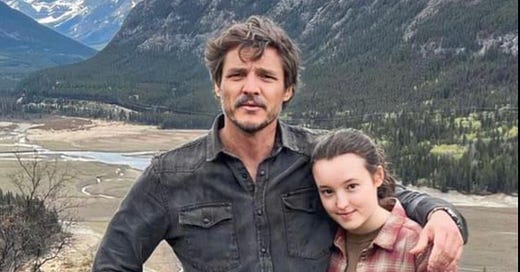


Why would they do a Mare of Easttown without Mare (of Easttown)? 🥴
Okay, I think I’ve now pieced together why I skipped to the end last night-- I was looking for a recommendation that wasn’t a show my wife had already seen. She watched the bear, killing eve, and happy valley already, so while I would like to watch all three eventually, I’m glad that I’m now armed with a few titles neither of us have seen; the diplomat, the candy one, and I forget what the third one was. But it sounded good.
I mostly don’t like coverage of TV these days, even though there’s plenty of good stuff to watch. Maybe because I’m not in my 20s, but most TV writing I stumble over seems to be written by people I don’t trust. And that’s even when it’s not focused on superhero or sci-fi shows.